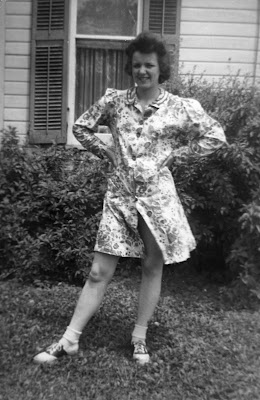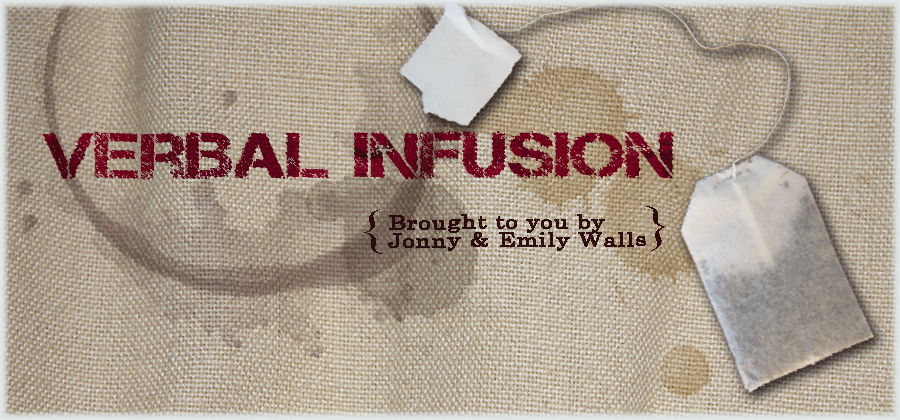 My grandmother screamed routinely in movie theaters. I'm not just talking Psycho. I'm talking Seabiscuit.
My grandmother screamed routinely in movie theaters. I'm not just talking Psycho. I'm talking Seabiscuit.She prepared and froze her Thanksgiving casseroles before Halloween, her immaculate freezer a refugee camp for bulk-purchased Cool Whip and stalks of rhubarb.
When she trumped my trick in Euchre, she sang her high school fight song in its entirety.
For holidays, my family traveled from four states away to see her, and we always found her furniture covered in bedsheets "to keep it nice for company."
She ironed my grandfather's underwear. When I objected to the futility of de-wrinkling hidden boxer briefs, she responded, "Ah, but you've never seen him in his underwear."
My sister likes to say that our Mama Jo never shoveled snow a day in her life; she swept it with a broom as it fell.
"Towels are for sissies," my grandmother must have thought, because I never saw her use them on her trek down the hallway to her bedroom after a bath, her clothes folded neatly in her arms.
When I was a child, I feared my grandma, at least in part because I was not allowed to call her "Grandma." She insisted on being known as "Mama Jo." Grandmas were old, feeble, dowdy; Mama Jo was anything but. Once when I was five years old, I said to her, "Thank you, Grandma." She whipped around, pointed her finger at me about an inch from my nose, and shouted, "WHAT did you call me?" I would have pooped my pants right there if I weren't even more afraid of spoiling her white carpet. No one in the world but my Mama Jo ever had the audacity to keep white carpet pristine and plush for twenty plus years. She was manic about cleaning, so much so that if you wanted to talk to her you had to follow her around while she straightened and folded and dusted and wiped.
I avoided her in my younger years, but as I aged I sought her company more. She always spoke in superlatives, so I was sure to get marvelous feedback from her for any story I told. I could count on her for a "That's terrific, honey" or a "Well doesn't that beat all," no matter how dull my tale. When it was her turn to tell a story, she was magnetic. She whooped and hollered. She shook her head in dismay or elation, as the situation warranted, and she splayed her fingers wider and wider with the increasing intensity of her story. Her energy was boundless, so it's no wonder that friends gathered to her in droves.
I remember one particular conversation I had with her in 2003. On summer break after my freshman year of college, I visited my parents, who were temporarily living with my grandmother. Mama Jo and I stayed up late talking, as we often did, and she launched into what was more or less her life story. I had never heard it all in sequence the way she told it that night, so I was fascinated by each step. She told me about her parents' clothing store in Logansport, Indiana, and how she had spent her childhood in that town. She adored her mother (who she only ever called "Mother"), and she told me about watching Mother put on her lipstick to get ready for a night of cards and conversation with their supper club. I never met my great-grandmother, but I'll be she was charismatic like her daughter.
Mama Jo also told me about her older brother, Bill, who had spina bifida, if I recall correctly. He had limited or no use of his legs, so when he was a child he got around on a little cart pulled by a goat. Mama Jo loved Bill and toddled after him everywhere. When they were older, he played piano in a kind of a big band outfit, and she sat in on practices and danced along and had herself a time. She was in her early teens at the time, so it was extra special to her that Bill let her, his little sister, tag along with the band. He was her hero.
As Mama Jo's story progressed, she eventually got to the later years of her loved ones and ultimately to Bill's death. The details are fuzzy for me, but I think Bill died of cancer. He was in the hospital, declining rapidly, and Mama Jo went to see him. Bill had become a Christian just a short time before, so he was ecstatic with joy despite his pain. I remember that when she told me about Bill's death, Mama Jo was cleaning her kitchen counters (of course). She wiped and wiped the same spot as she spoke, and her tears fell to the end of her nose and dropped onto the counter she was cleaning.
"I had relied on Bill for so long, you see," she said. "I saw him there in the hospital and we both knew he was going soon. I said to him, 'Bill, what am I going to do without you?' He said, 'You've got Bob [my grandpa] and the kids, Joan. You'll be fine. This isn't the end.'" Mama Jo sobbed in earnest and paused in her cleaning to wipe her nose. "So Bill died soon after."
She said it so simply and moved on quickly to other stories, but now when I recall that night in 2003, my thoughts go immediately to what she said about her last conversation with Bill. That little snippet was significant to me, and for many years I tried to figure out why. It was only in this last year, in fact a month before my dear Mama Jo's death, that I realized why her words had such weight with me: They would one day be my own.
After a severe stroke in 2004, Mama Jo began the period of mental and physical decline that would make up the rest of her life. The stroke robbed her of her energy and sharpness, but it was encephalitis in 2007 that took away her short-term memory. When I visited her in recent years, I gave her lots of hugs and told her constantly that I loved her, but I never said to her what I was really thinking: What am I going to do without you? A month before Mama Jo died, I got a call from my mom that Mama Jo had taken a turn for the worse, perhaps due to another stroke, and that Mama Jo was in quite a bit of pain. Naturally I cried when I got the news, and I turned to Jonny for comfort. He held me and shushed me and stroked my hair, and he asked me gently, "How do you think you'll feel when she dies?"
I considered for a few moments and then said, "I think I'll rejoice. I don't want her to go, but I know that I only want her here for my own benefit. I like that I still get to hear her voice and that she tells me she loves me every time I see her, but I hate that she's in pain now. Mentally, she's been gone a long time. I know she'll be happier with Jesus, but it's hard to let her go."
Soon after, Mama Jo's conversation with Bill came to my mind, and I realized that in that conversation in 2003, she had answered my future question. Like Mama Jo had done before me, I asked, "What am I going to do without you?" and like Bill's response, the answer came. "You'll be fine. This isn't the end."
When we buried Mama Jo on New Years Eve of this last year, my family gathered around her grave to shovel dirt onto her lowered casket. We prayed prayers of thanksgiving, and as I watched my family take turns digging into the earth and sprinkling a covering over her grave, I had an irrepressible and inappropriate impulse to laugh. I had to hide my face to keep my wide grin out of sight of my mourning relatives. Nothing about death is funny, but I found that I could not help rejoicing that burial, an act of finality, was not in fact final. It was not the end for Mama Jo or for Bill, and it wasn't the end for me.
Since that cold December day, I've gone through different stages of mourning for Mama Jo. I still cry sometimes, and she would laugh to know that the triggers are usually cleaning-related. I know there is more to process with her death, particularly because she was my third grandparent to pass away, and I am now beginning to mourn, not just her, but her entire generation.
There is comfort too. That night that Mama Jo told me her life story, she also told me another bit of information. She told me that she had been praying for my husband and that she had just purchased my wedding gift: Oneida silverware from L. S. Ayres. This was news to me, especially because I wasn't dating anyone and in fact had NEVER dated anyone. I was peeved too, because she refused to give me the silverware early and told me I would only get it when I got married.
"But that's archaic," I said. "What if I never get married? Are single people to eat with their hands?"
She was indomitable, as always. "Oh, you'll get married," she said. "And he'll be good-looking too. I know it."
On May 15, 2009, I married Jonny Walls, a looker, on a beach in North Carolina. Mama Jo came to the wedding, but in her advanced state of decline she did not recognize Jonny (though she had met him many times before), and she forgot the ceremony minutes after it happened. Naturally, she did not remember to get me a wedding gift, but as was so typical for her, she had prepared years in advance with that silverware from L. S. Ayers. A few months after the wedding, I unpacked the silverware that was finally mine, and as I grabbed a couple of spoons from the box, the receipt she had included fell to the floor. I picked it up and checked the date. She had purchased the silverware on May 15, 2003, six years to the day before I got married.
I'm looking forward to having a good laugh with her over that one when I see her again.





